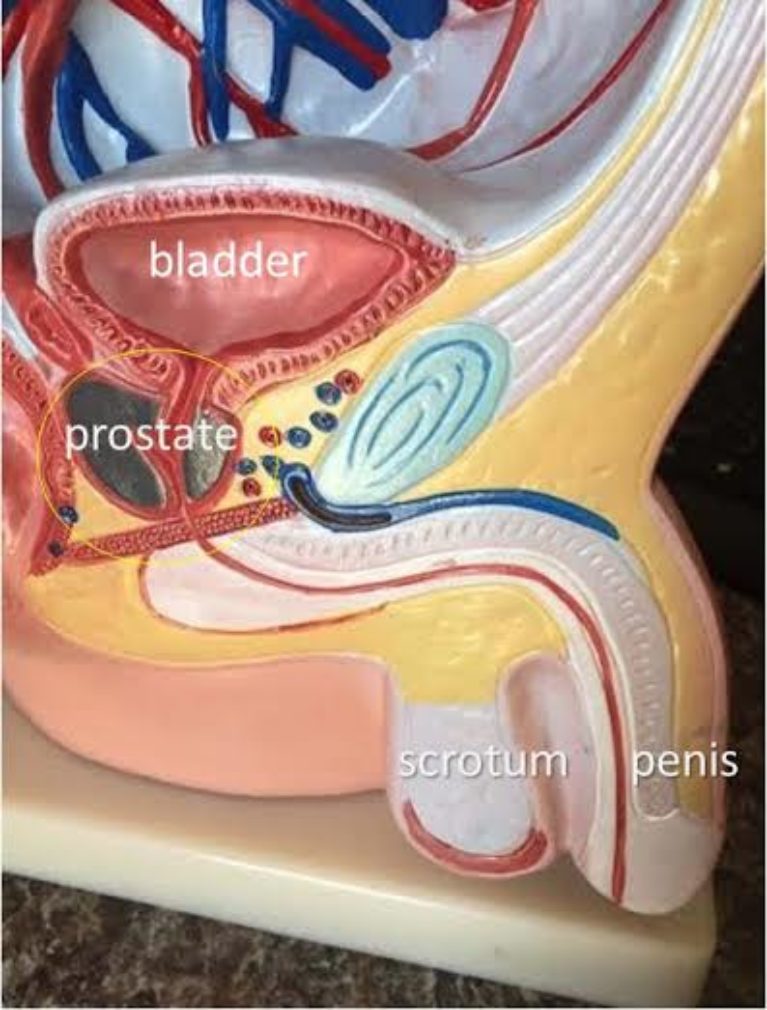This is general information for readers and is intended only for guidance and does not intend to replace consultation with your doctor or medical treatment.
Four facts about your prostate
- Your prostate is about the size of a walnut
- It produces a fluid that makes up 30% of the volume your semen
- This fluid protects your little swimmers
- Your healthy prostate gland weighs in at around 20 grams
Can you find your prostate?
#GoogleMyProstate #SpotTheProst
Go to the bladder. The urine outlet pipe (urethra) drains your bladder. Just below the bladder is the prostate. It surrounds your urethra like a cuff. The urethra is to the prostate like a core to an apple. Have a look at my labelled photo and see if you can spot the prost!
Does the size of your prostate matter?
Three reasons why you should go for a life-saving poke
#TakeItLikeAMan #ProstateSizeMatters
- Prostate cancer is one of the most common cancers in men
- About one in six men may develop prostate cancer
- It is the second most common cancer causing death in men
Unlike women, who visit their gynaecologist yearly, men have a unique tendency to avoid visiting doctors to screen for prostate cancer. I mean, who wants a finger up their backside…but think about it: do you really want to miss out on the rest of your life?
Do you have prostate cancer?
#CancerSignsAndSymptoms
- Painful, burning or difficulty urination
- Slower, weaker urination: A larger prostate exerts more pressure on the urethra, making it feel like the urine never gets past second gear
- Lower back pain
- Blood in your urine or semen
What is benign prostatic hyperplasia?
#BenignProstaticHyperplasia
In some instances a prostate enlarges due to reasons other than cancer, e.g. benign hyperplasia of the prostate. This does not require aggressive treatment like prostate cancer, but without tests to confirm, you cannot get the right treatment.
3 Ways doctors screen for prostate cancer?
- PSA blood test
- Rectal examination
- Biopsy if cancer is suspected
Your prostate produces a substance called Prostate-Specific Antigen, or PSA for short. Men without prostate cancer have lower PSA levels than men with prostate cancer. Your doctor will send you for a blood test to measure your PSA levels The goal of screening is early detection.
#early detection
An elevated PSA level does not always spell cancer. There are other reasons why PSA levels could increase like inflammation of the prostate, older age or even an enlarged prostate gland. There are some reasons why men could have lower than anticipated PSA levels, for example when they are on certain medications like statins, aspirin or diuretics. Your doctor will take your medical history into consideration when assessing your risk.
When should you be screened for prostate cancer?
#CancerScreeningGuidelines
In 2013 Prostate Cancer Foundation of South Africa released the following guidelines:
1. Routine PSA testing from the age of 40 years in black African patients
2. Routine PSA testing from the age of 40 years in those with a positive family history of prostate and or breast cancer in a first degree relative.
3. Routine PSA testing from the age of 45 in all other men
#MaleRectalExam
- A digital rectal exam is performed by your doctor
- It is done to determine whether there are any irregularities on the prostate gland
- Many men avoid this exam because of embarrassment or fear, but it is such a short investigation, and it could save your life.
- Remember: Early detection saves lives! The benefits outweigh the discomfort!
If your doctor suspects prostate cancer, he will consider a #biopsy
During a prostate biopsy, small tissue samples are removed from the prostate. These samples are studied under a microscope to see whether cancerous cells are present. This will allow the doctor to diagnose the cancer and to do staging of the cancer.
#ProstateBiopsy
If you are diagnosed with prostate cancer, your doctor will discuss the treatment options with you.
In a future article I would love to elaborate on treatment options and where physical therapy fits into the bigger picture of recovery after prostate surgery.


